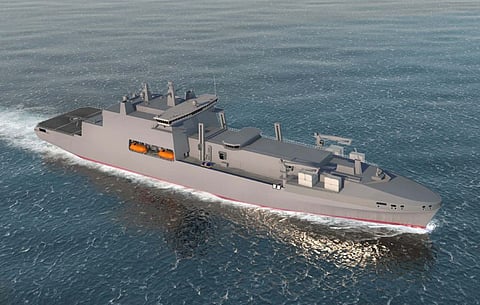

The UK Ministry of Defence (MOD) has selected a consortium formed by naval architecture firm BMT, Belfast-based shipyard Harland and Wolff, and Spanish defence contractor Navantia as the preferred bidder that will design and build the future class of auxiliary ships slated to support the Royal Navy's fleet operations.
The British-led Team Resolute consortium, which was selected over three other multi-national contenders, will be awarded a £1.6 billion (US$1.89 billion) MOD contract to manufacture the vessels, subject to HM Treasury and Ministerial approval. Once in service, the three Fleet Solid Support (FSS) ships will be operated by the Royal Fleet Auxiliary (RFA) and will keep the Royal Navy's Queen Elizabeth-class aircraft carriers and amphibious task groups supplied with everything from ammunition to food as they sail on operations around the world.
The three new FSS ships will replace the RFA's sole support ship, RFA Fort Victoria, which has been in service for nearly 30 years. The replacement vessels will be designed and built to meet the needs of the Queen Elizabeth-class carriers and their fifth generation F-35 stealth fighters. They will also be equipped with energy-efficient technologies to reduce power demand and will have the capability to reduce carbon intensity by adopting low-carbon fuels and future energy sources.
Each vessel will be 216 metres long – making them the second longest ships in the Royal Navy after the Queen Elizabeth-class carriers – and 34.5 metres wide and will be capable of speeds of up to 19 knots. There will be cargo space for 9,000 square metres of supplies and stores.
The Team Resolute FSS ships will have commonality with the RFA's Tide-class fleet tankers, which were also built to a BMT design. The partnership expects this commonality will help reduce training overheads, ensuring that a greater number of personnel qualified to crew the vessels will be available in less time.
Each FSS will also have a flight deck able to host all helicopters in the current UK arsenal while the hangar is designed specifically for use by up to two Royal Navy Merlin utility helicopters as well as smaller unmanned aerial vehicles (UAVs).
Accommodations will be available for a 101-strong crew and up to 80 additional personnel such as helicopter crews and support staff.
Awarding of the manufacturing contract is scheduled for no later than the first quarter of 2023. The entire final assembly will be completed at Harland and Wolff's shipyard in Belfast. Blocks and modules for the ships will be constructed in the same yard, plus Appledore in Devon, all in collaboration with Navantia. Build work will also take place at Navantia's facilities in Cadiz, Spain.
